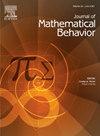Children’s mathematics concept learning of informal length measurement: Conceptual PlayWorld as an innovative approach in the beginning of primary school period
IF 1.7
Q3 EDUCATION & EDUCATIONAL RESEARCH
引用次数: 0
Abstract
Measurement is an essential and valuable mathematics concept closely linked to everyday life and is often one of the first few mathematics concepts children learn in educational contexts. Currently, limited research exists that investigates how implementing imaginary play could create conditions in supporting children’s learning of informal length measurement as they transition to school. To support children’s learning of informal length measurement, this study adapted Li and Disney’s (2021) Conceptual PlayWorld [CPW] in mathematics to conduct an educational experiment investigating how the implementation of CPW creates the conditions to support children’s learning during the transition to school. We argue that in the CPW, the use of imagination and the teacher’s dramatisation of the mathematics conceptual problems allowed opportunities for children to demonstrate and explore informal length measurement using their everyday understanding of concepts. In turn, it supports the teacher in embedding mathematical learning opportunities in the imaginary play context. CPW can be considered an alternative pedagogical approach that incorporates mathematical exploration through imaginary play, creates opportunities to support children to engage with and understand measurement concepts.
儿童非正式长度测量的数学概念学习:小学初期概念游戏世界作为一种创新方法
测量是一个与日常生活密切相关的重要而有价值的数学概念,通常是儿童在教育环境中最先学习的几个数学概念之一。目前,关于实施想象游戏如何在儿童过渡到学校时为支持非正式长度测量的学习创造条件的研究有限。为了支持儿童对非正式长度测量的学习,本研究改编了Li和Disney(2021)的数学概念游戏世界[CPW],进行了一项教育实验,调查CPW的实施如何为支持儿童在过渡到学校期间的学习创造条件。我们认为,在CPW中,想象力的使用和教师对数学概念问题的戏剧化让孩子们有机会利用他们对概念的日常理解来展示和探索非正式的长度测量。反过来,它支持教师在想象的游戏环境中嵌入数学学习机会。CPW可以被认为是另一种教学方法,通过想象游戏结合数学探索,创造机会支持儿童参与和理解测量概念。
本文章由计算机程序翻译,如有差异,请以英文原文为准。
求助全文
约1分钟内获得全文
求助全文
来源期刊

Journal of Mathematical Behavior
EDUCATION & EDUCATIONAL RESEARCH-
CiteScore
2.70
自引率
17.60%
发文量
69
期刊介绍:
The Journal of Mathematical Behavior solicits original research on the learning and teaching of mathematics. We are interested especially in basic research, research that aims to clarify, in detail and depth, how mathematical ideas develop in learners. Over three decades, our experience confirms a founding premise of this journal: that mathematical thinking, hence mathematics learning as a social enterprise, is special. It is special because mathematics is special, both logically and psychologically. Logically, through the way that mathematical ideas and methods have been built, refined and organized for centuries across a range of cultures; and psychologically, through the variety of ways people today, in many walks of life, make sense of mathematics, develop it, make it their own.
 求助内容:
求助内容: 应助结果提醒方式:
应助结果提醒方式:


